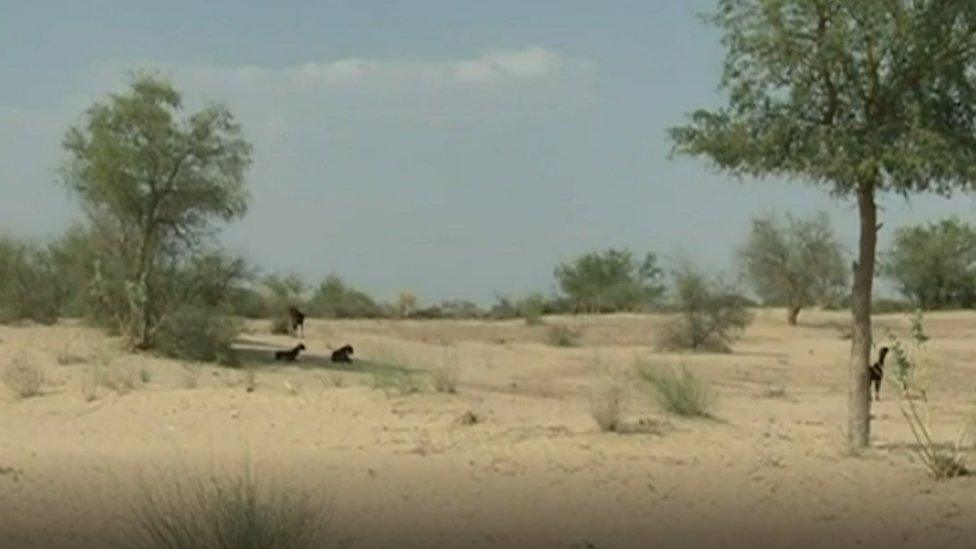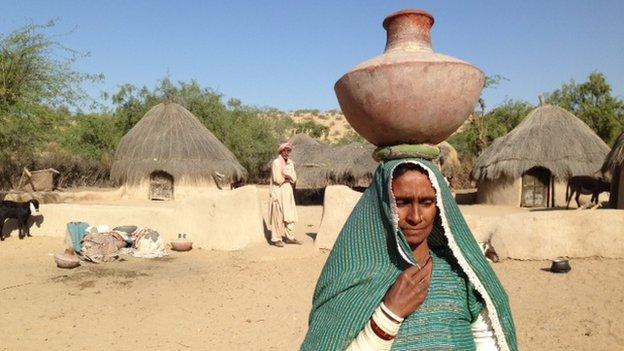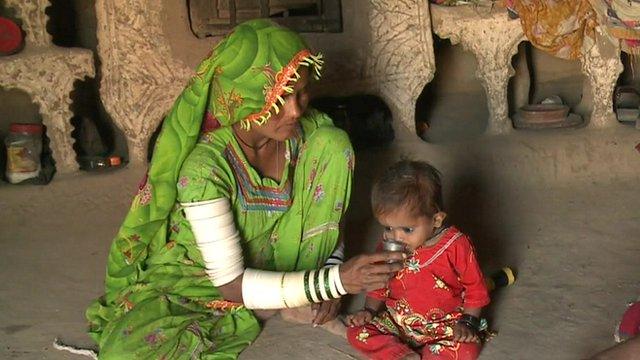Pakistan police investigate 'joint suicide' of sisters-in-law
- Published

The Thar region is one of Pakistan's poorest areas
Police in Pakistan are investigating the apparent joint suicide of two young women in one of the poorest areas of the country's south.
The bodies of Nathu Bai and Veeru Bai, who had a baby son, were found on the farm where they lived.
They were married to two brothers who worked as farmhands for a local landowner near the town of Islamkot.
It is unclear why the women took their lives. Campaigners say there have been a spate of suicides in the area.
The southern Thar desert area of Pakistan is resource-rich, but also one of the country's poorest regions.
Police say they don't have a motive for why the women took their lives in the village of Kehri.
"I personally went to the site. It was apparently a suicide, though we are still looking into it," local police station chief Inspector Kabeer Khan told the BBC.
"It's really hard for me to say why they did it. It's the harvest season so we can't say hunger could be a reason. But you can't rule out domestic tensions caused by overwork or negligence."

Little has been reported about the lives of Nathu Bai and Veeru Bai. The women were in their early twenties and married to two brothers, Chaman Kohli and Pehlaj Kohli.
Veeru Bai's son was a year old, a local resident who knew the family told the BBC.
For the last six months the couples had been living on the farm some distance away from the village to help harvest the maize crops, another resident said.
When locals spotted the women's bodies on Sunday morning, they informed the police.
Dr Pushpa Ramesh, who examined the bodies in hospital in Islamkot late that night, told the BBC "there were no other injuries or signs of trauma on the bodies" to suggest any other cause of death.
"Their mothers, brothers and the in-laws were all here. They were devastated by grief," he said.

You may also be interested in:
From 2014:
Almost 140 children have died of starvation in the Thar desert region

Allah Jodio, who lives in the same neighbourhoods as the Kohlis, said he asked the women's husbands and their father-in-law what could have caused them to take their own lives.
"But they said there was no apparent reason. Nothing extraordinary had happened," he said.
Mr Jodio believes domestic tensions may be behind the tragedy.
"You see, our people are very poor and often live from meal to meal. And they had been working on the farms for the last several months. There's a lot that keeps going wrong and needs to be righted, so there must have been angry arguments. Both were young, and must have taken the disastrous step in their youthful rage."
At least 59 people have killed themselves in the Thar region so far this year, including 38 women and two children, while about 198 suicides were reported in 2018, according to civil society group, Aware.Org.
The reasons cited are increasing poverty, and population displacements caused by coal mining projects.
Campaigners say these and other factors mean domestic tensions are commonplace.
The situation is made worse by the absence of any government safety net to help the vulnerable.
The region is populated predominantly by low-caste Hindus, who are a minority in overwhelmingly Muslim Pakistan.
They are generally looked down upon by local landowners, who include some upper-caste Hindus, and the wider Muslim population.
If you've been affected by a mental health issue, help and support is available. Visit Befrienders International, external for more information about support services.
- Published31 March 2015

- Published17 March 2014
